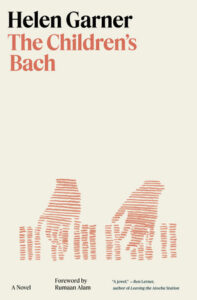If you want to sell someone on a novel, I’m told you’re supposed to start with a plot synopsis. This is how the publishers do it, that tidy precis on the jacket. But it’s also how teachers convince their students, librarians their patrons, booksellers their customers. It’s how passionate readers push their favorite books onto anyone who will listen. In writing a foreword like this one, am I even supposed to be selling you on this novel? Presumably. And yet, if some teacher, librarian, bookseller, or friend had tried to get me to read The Children’s Bach by telling me what happens in its 150 or so pages, I’m not sure I’d have picked it up. What a book is about is, to some degree, beside the point. A plot is quite apart from the experience of reading a book.
I’m afraid I can’t speak with authority on Australian literature of the twentieth century. I cannot direct readers to critical writing grappling with Helen Garner’s work. I’m no critic, no academic, no specialist on anything at all: I confess, I had to look up when The Children’s Bach was first published (1984). You might say, though, that I’m a fan. No, more than that: I’m an enthusiast, even an evangelist. I’ve successfully persuaded several people, friends and strangers alike, to read this novel. Put simply, I love this book.
Garner shows us something vast, as true in 2023 as it was in 1984—how we live.
When recommending it, I rarely describe what it’s about. More effective, I think, is to tell the story of the first time I read The Children’s Bach. We were having the house painted, a detail that feels salient, almost like something out of Helen Garner’s fiction, with its interest in middle-class domesticity. Every room smelled toxic, and all our things were boxed up. My husband was out of town, so the children and I went to sleep at my office, elsewhere in Brooklyn: my elder son in a pile of blankets like a puppy, my younger kid and I on the too-firm sofa bed.
My book-buying eclipses my book-reading. There are huge piles of things I’ve been meaning to read waiting patiently for me. But I’d been hearing Helen Garner’s name from readers I trust for a while, so The Children’s Bach was the one I selected from my teetering stack that night.
I remember, with utter clarity, lolling on that uncomfortable bed, my eight-year-old’s sharp elbows at my side, his loud breath reassuring. I remember squinting in the inadequate light. I remember trying to keep the characters straight (good luck). I remember the sense that I was not quite understanding something, which I consider the most exhilarating feeling a work of art can elicit. I read the thing in one sitting-nearly impossible not to, given its brevity, its momentum, its magic-and I remember these sentences very clearly:
This was modern life, then, this seamless logic, this common sense, this silent tit-for-tat. This was what people did. He did not like it. He hated it. But he was in its moral universe now, and he could never go back.
Maybe these lines aren’t as powerful out of context. Maybe quoting to you the book I want you to read is cheating. What can I say but that these lines, this book, filled me with some strange energy, close to panic, or possibly rage. I finished the novel and had the most unexpected impulse. I wanted to go for a run. I wanted to sweat, feel the late-summer air on my skin, to traverse the dark blocks of this sleepy part of Brooklyn and get away from it, this modern life, this seamless logic, this common sense, this silent tit-for-tat. But I couldn’t leave my sleeping children alone, and the next morning would be an early and busy one, from the overseeing of the brushing of teeth to the packing of school lunches to the dealing with the housepainters and so on, and also I hate running, so I just turned off the lights and slept uneasily.
*
Maybe that wasn’t convincing. Fine, let’s try synopsis.
The Children’s Bach is about the collision of several lives. It takes place in Melbourne, in the 1980s. There’s Athena and Dexter, a suburban couple with two sons, Arthur and Billy, who was born with some never quite explored developmental disability. A chance encounter reunites Dexter with Elizabeth, a college chum, and her younger sister, Vicki, come to stay because their mother has died. The group is tethered as well to Philip, Elizabeth’s sort-of boyfriend, and his daughter, Poppy. It’s a loose alliance, an at times confusing roster of names, especially as Helen Garner doesn’t overexplain.
So you understand how stylish a writer Garner is, I’ll quote her again as she dispenses with backstory:
How strange it is that in a city the size of Melbourne it is possible for two people who have lived almost as sister and brother for five years as students to move away from each other without even saying goodbye, to conduct the ordinary business of their lives within a couple of miles of each other’s daily rounds, and yet never to cross each other’s paths. To marry, to have children; to fail at one thing and to take up another, to drink and dance in public places, to buy food in supermarkets and petrol at service stations, to read of the same murders in the same newspapers, to shiver in the same cold mornings, and yet never to bump into each other.
It’s hard to say which of the characters listed above is the book’s protagonist. The Children’s Bach skips around among these people, and readers can glimpse just enough of them. In a sense, the novel has no main character, and is less about a single person than a single period of time. Things happen, which I won’t spoil, so my synopsis boils down to this: this is a story about how life happens to all of us.
Sometimes fiction shows us reality with utter clarity.
I’ve come to think of Dexter as the book’s hero, or maybe I mean its most pitiable creature. He’s the subject of those five sentences that so affected me the first and every subsequent time I’ve read Helen Garner’s masterpiece. He’s the one realizing how disappointing modern life is. He’s the reader’s true proxy, or at any rate, embarrassingly, he’s mine. Dexter, when we first meet him, is so pure an optimist that when someone complains of the winter cold he says, “But you can smell things growing.” But Dexter cannot maintain this. The world is a complicated place, and people do bad and foolish things, and we are those people.
*
Garner is an avid diarist. She’s published many of her journals, and they illuminate, for me, the experience of reading her fiction. Here’s an entry from the first volume, Yellow Notebook: “Everyone’s talking about Apocalypse Now. My work seems piddling, narrow, domestic.”
I admire Garner’s frank ambition, the charming notion that literary fiction might go head-to-head with Hollywood. What I wish I could tell the younger woman who wrote that line, what I hope the author realizes now, is how mistaken she is.
The Children’s Bach is brief but hardly piddling. While I suppose you might rightly call its focus narrow—a short stretch of time touching nine invented lives—there’s something so poignant in hearing the author use domestic as it is too often deployed, as epithet, synonymous with insignificant. Let’s agree to abandon forever the idea that the depiction of family life is the province of women artists, and therefore insubstantial. Let’s refuse to hear a sneer in the term domestic.
Let’s use novels like The Children’s Bach to argue this point. To be sure, it’s a novel interested in romance and parenthood, in making dinner and changing the bed linens. But Garner shows us something vast, as true in 2023 as it was in 1984—how we live. The novel isn’t screed or indictment, but as reasonable and impartial as a mirror. I’m not pleased about seeing myself in Dexter, please understand. But sometimes fiction shows us reality with utter clarity.
In another diary entry, Garner writes, “I will never be a great writer. The best I can do is to write books that are small but oblique enough to stick in people’s gullets so that they remember them.” Garner is wrong, of course. The Children’s Bach is the realization of that particular ambition. It’s lodged somewhere in me, call it my gullet. Who but a great writer could manage such a trick?
__________________________________

From The Children’s Bach by Helen Garner, forward by Rumaan Alam. Copyright © 2023. Available from Pantheon Books, an imprint of the Knopf Doubleday Publishing Group, a division of Penguin Random House, LLC.
